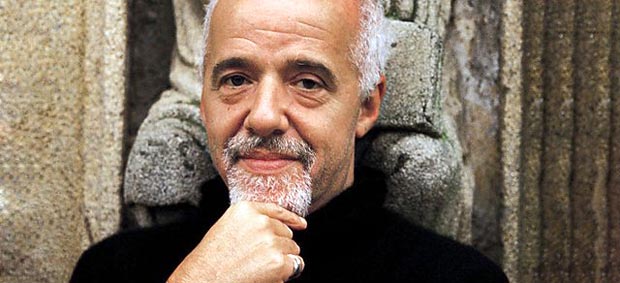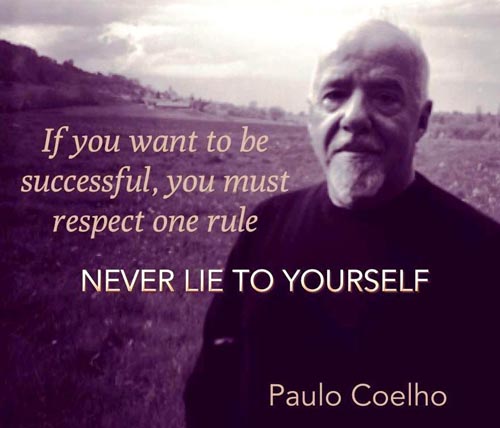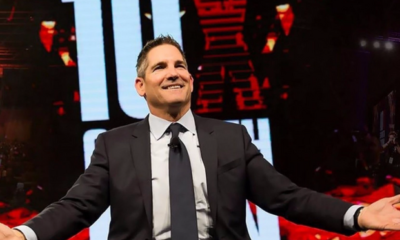Life
4 Things I Learned About Life From Paulo Coelho
I haven’t read The Alchemist.
Yeah, I know. For someone who writes an article about Paulo Coelho AT LEAST I should read the book that made him a success.
But the only book I read was Aleph and it was really good. After reading it, I had an image of him as a very spiritual and calm person.
To learn more about Paulo Coelho, I read his authorized biography, “The Warrior’s Life,” which was written by Fernando Morais.
The most interesting parts of the book were the stories of his youth, which were far from what I had imagined. They were inspiring and made me reflect upon my life.
Read further to know the four life lessons you can learn from Paulo Coelho’s youth. Trust me – it’s worth it.
1. If you have a weakness, learn to compensate for it with your strength.
Paulo was weak physically.
According to his biography he was “very thin, frail and short.” He had a nickname – Pele – which means ‘skin. It was given only to those who were always being bullied by their classmates.
Considering his physical weakness, it was hard for Paulo to gain the respect of his peers. Yet he found out that despite his weakness, he managed to gain their respect.
How?
I quote: “By knowing things no one else knew and reading stories none of his peers had read was one way of gaining respect.”
The lesson: If you think you have a weakness, you don’t necessary need to remove that weakness. Some weaknesses, especially physical ones, are hard to get rid of. A more effective way would be to find your strengths and work on them until you are at least above average.
Or better yet: Be so good they can’t ignore you.
2. Rejection doesn’t matter. What matters is what you do after being rejected.
Paulo believed in himself. He believed that he was a good poet and that his poems were not suitable for small magazines. So he sent his poems to the ‘Escritores e Livros,’ a reputable literary column in a newspaper called Correio da Manha.
After a week, Paulo looked at the newspaper and read the following:
“To all young show-offs who are desperate to get themselves a name and publish books, it would be worthwhile recalling the example of Carlos Drummond de Andrade, who only published three volumes totalling 144 poems in 15 years.”
Like any normal person, he took it personally, but managed to regain his confidence and write his own version of Rudyard Kipling’s famous poem “If…”.
If you ask your friends and enemies for a chance.
If you can hear a ‘no’ and take it as a ‘maybe,’
If you can start from the bottom and yet still value the little that you have.
If you can improve yourself each moment and reach heights without succumbing to vanity.
Then you’ll be a writer.
The lesson: Rejection always hurts. Some say that rejection shouldn’t be taken personally, but honestly, I don’t think that advice helps. We value ourselves and the things we create, thus rejection brings a cognitive dissonance inside our minds.
Two conflicting thoughts, self-belief and self-doubt, wage wars to determine who will stay and rule the kingdoms inside our heads.
When there are two conflicting thoughts, we need something to guide us on what to do after the rejection. If you don’t know what to do or what to believe in, most of the time the evil side will win the war.
In the case of Paulo, his self-belief won and this is because of a certain obsession of his.

3. Be obsessed with your dream
Paulo was obsessed with the idea of becoming a famous writer. Yet, it was funny that the obsession only bore fruit in his later years.
This is because he was always changing his art: from poetry to acting, directing, writing about the occult, and lyric writing.
Although he gained success in some of his ventures, he kept reminding himself that he wanted to be a famous writer. That obsession made him what he is today.
The lesson: Sometimes, we think our dream lies buried under a pile of work or studies. I’m the same. I am going to a medical school, but I know being a doctor is not my dream. I want to be an entrepreneur.
For several reasons, I can’t cancel my entry to medical school. It looks like I don’t have a choice, but I actually have one: to choose to stick with my dream no matter what or to succumb to the path people ‘forced’ me to go on.
The same thing goes for you. Be obsessed with your dream and don’t let it die easily.
4. Your ‘horrible’ past doesn’t make you a failure in the future
One word sprung up inside my mind when I read about Paulo’s past – horrible.
Paulo failed in his studies, almost killed a boy because of his driving, was forced to stay in a psychiatry clinic because of his escalating problems, took drugs, was kidnapped by a secret organization and embraced Satanism.
There was more, but you get the picture.
Looking at his past, I was amused by the stark difference between his past and future selves. It shows how someone’s past is not a good predictor of his future because he is capable of changing it if he is willing.
The lesson: The problem with most of us is we focus on things we can’t change. It is true that our past can influence our future, but we don’t want to let that influence spread too much and work of its own accord.
We should stop doing that: Stop letting the past be our fortune-teller. What we need to do is to focus on the present and take control of our future.
Why?
We are the fortune-teller.
Conclusion
Let me leave you with a quote from the man, Paulo Coelho, himself:
“At a certain point in our lives, we lose control of what’s happening to us, and our lives become controlled by fate. That’s the world’s greatest lie.”
Thanks for reading.

Question: What have you learned from reading Paulo Coelho’s books?
If you haven’t read The Alchemist by Paulo Coelho make sure you get your hands on a copy here:
Feature Image by: REUTERS/Eloy Alonso
Life
Imposter Syndrome Is Rooted in Your Past But Here’s How You Can Rewire It
Imposter syndrome is most prevalent in highly successful women

Imposter syndrome is “the persistent inability to believe that one’s success is deserved or has been legitimately achieved as a result of one’s own efforts or skills.” (more…)
Life
The Surprising Mental Health Tool You Probably Haven’t Tried
Through journaling, I arrived at a more balanced perspective, it reinstated my sense of gratitude and led me to accept my disability

In two particularly difficult times in my adult life, my journaling practice is helping me heal emotionally. It has been a vital tool for helping me see the bigger picture and land in a place of gratitude. (more…)
Life
How to Stop Comparing Yourself to Others and Find True Happiness
Comparison is the thief of joy; it robs us of our happiness, self-esteem, and peace of mind

In today’s hyperconnected world, it’s easier than ever to fall into the trap of comparing ourselves to others. Social media platforms like Instagram, Facebook, and LinkedIn constantly bombard us with curated highlights of other people’s lives, making it seem like everyone else is happier, more successful, and more fulfilled than we are. (more…)
Life
Harness the ‘Battery Effect’ to Transform Life’s Tensions into Your Greatest Strength
Recharge your life batteries by shifting your mindset today

I believe our life capacity is determined by the skillsets we develop on this spinning rock we call Earth. By “life capacity,” I mean our ability to embrace and sustain joy. (more…)
-

 Success Advice3 weeks ago
Success Advice3 weeks agoThe One Mindset Shift That Made Me Irreplaceable At Work
-

 Scale Your Business4 weeks ago
Scale Your Business4 weeks agoWhy Smart Entrepreneurs Never Skip This One Business Expense
-

 Success Advice3 weeks ago
Success Advice3 weeks agoHow Playing by the Rules Became the Smartest Business Strategy
-

 Did You Know2 weeks ago
Did You Know2 weeks ago7 Surprising Life Lessons Video Games Taught Me That School Never Did
-

 Success Advice2 weeks ago
Success Advice2 weeks agoHow to Build Trust, Kill Micromanagement, and Lead a Team That Thrives
-

 Scale Your Business2 weeks ago
Scale Your Business2 weeks agoHow to Build a Workplace People Actually Want to Show Up To
-

 Success Advice2 weeks ago
Success Advice2 weeks agoSuccess Isn’t Sexy: 5 Daily Habits That Actually Work
-

 Scale Your Business2 weeks ago
Scale Your Business2 weeks agoHow Smart Entrepreneurs Cut Financial Chaos in Half with One Simple Switch






























Pingback: Wake up! Stand up! Embrace Life – Positive thoughts and Facts of Life